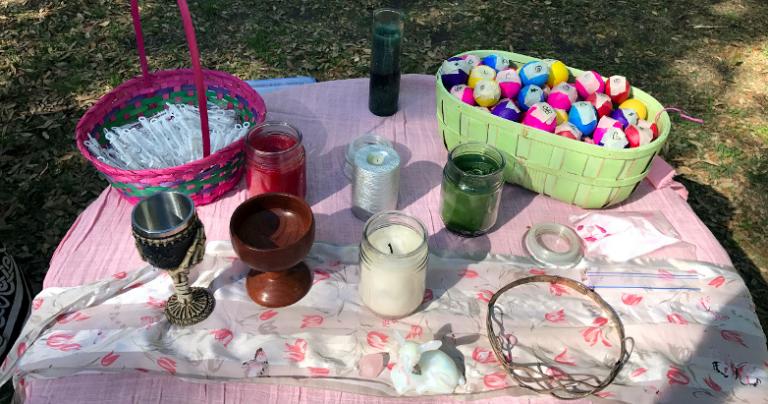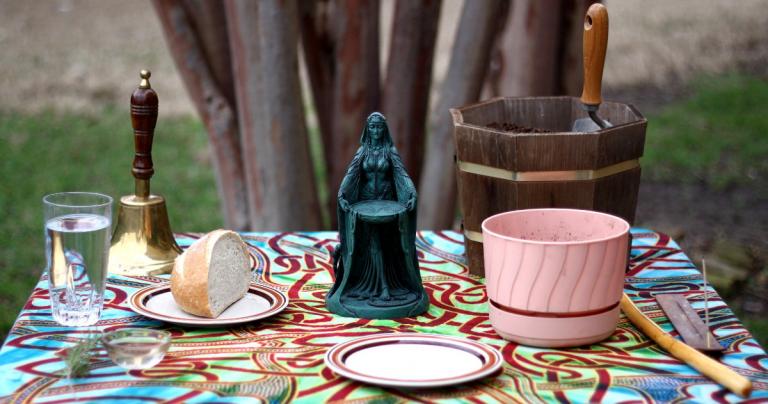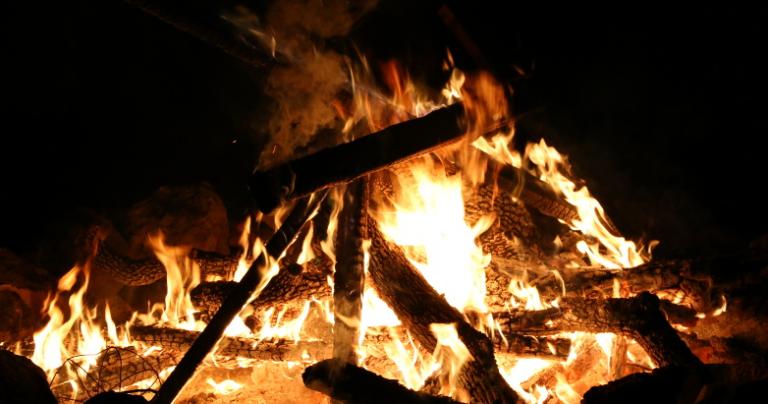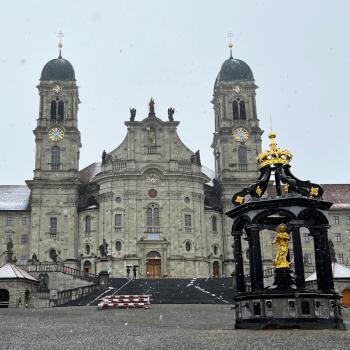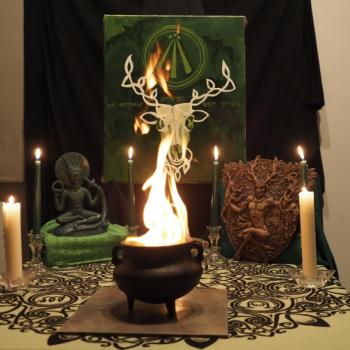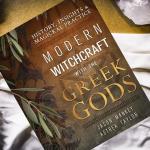While at Pantheacon, I had a wonderful lunch with Kemetic scholar Matt Whealton. We discussed his recent trip to Egypt, his studies in the ancient Egyptian language, and the basics of Egyptian ritual. During the conversation, Matt pointed out that for the Egyptians, life was forever “teetering on the edge of chaos.” Through their daily temple rituals, Ma’at was maintained – the proper order of things.
Then last week I listened to the latest edition of the Weird Web Radio podcast. Host Lonnie Scott (who interviewed me last year) talked with Morgan Daimler about Faeries and Witchcraft. Morgan said that for our ancient ancestors, seasonal celebrations were more than an excuse to have a party. They were obligations to the Gods and to the Good Neighbors – obligations that if not met would have serious consequences.
Certainly it is good to “sing, feast, dance, make music and love.” Good religion is joyous religion. It reminds us that although life is difficult and often painful, it is still good, and it is a blessing to be alive in the material world. But as we move toward the Spring Equinox – a time of balance – we would do well to remember the obligations of our seasonal celebrations.
How we got here
Those of us in the United States live in a country founded by Puritans who banned the celebration of Christmas. Many of us came to Paganism from religions that preached hellfire and brimstone, that threatened us with eternal torments if we didn’t do just right. We grew weary of all the “thou shalts” and “thou shalt nots” and we were eager to embrace a religion of wonder, magic, and sensuality.
Many Christians have grown tired of this too, though some of their responses are of dubious quality. We see the “prosperity gospel” that promises health and wealth to those to believe the right things, if they just believe strongly enough. We see an abundance of “seekers” who graze at the buffet of the world’s religions, looking for just the right path but never exploring anything in any depth. Religion has gone from its original meaning (from the Latin religare meaning “to bind together”) to just another expression of consumerism, with people looking for what they can get and never thinking about what they can and should give.
It’s time for a healthy balance to be restored.
Relationships require work
Paganism is a religion of relationships. It fosters honest, healthy relationships between us and our Gods, our ancestors, Nature, and the many other persons with whom we share this world. And as anyone who’s ever been in a romantic or family relationship knows, relationships require work.
If your partner forgets your birthday, at the least you’re going to be disappointed. If they mutter “happy birthday” as they’re walking out the door, with no card or cake or present, you’re going to feel like maybe you don’t matter very much to them. Yes, they talk to you every day, but this day is special, and it needs something special to mark its observance.
Our spiritual relationships require work as much as our human relationships. They require the constant work of daily spiritual practice, but they also require the major celebrations of high days and holy days.
For those of us who are Pagan polytheists, this presents a bit of a challenge. The Wheel of the Year doesn’t have a slot for every deity. Imbolc is for Brighid and Lughnasadh is for Lugh, but when do we fulfill our obligations to Cerridwen or Cernunnos or Athena? You can’t honor every deity from every culture, but if a God is important to you, They should have Their day at some point. There may be historically appropriate days, but if not, pick one. Establish your own liturgical calendar.
The same is true for our other spiritual allies. Do you honor your ancestors at Samhain? Are there specific ancestors who need their own days of remembrance? What about the land spirits where you live? Relationships with the Fair Folk need constant nurturing.
In our eagerness to celebrate the return of Spring, let us not forget to acknowledge and honor the spiritual persons with whom we share the world.
Values require reinforcement
Growing up in the South, I never understood the fascination with Spring. But once I moved to Indiana and experienced a real Winter, I understood very well! The snow finally melts, the world turns from brown to green, and the wind doesn’t hurt your face when you walk outside. That’s something to celebrate.
But as we celebrate the turning of the seasons, let’s not forget the values the season teaches. In an agrarian society, Spring is the time of planting and of new beginnings. Planting is a lot of hard, dirty work and the harvest is never certain, but if we don’t do it, there won’t be a harvest.
So let’s celebrate the warming temperatures and the return of baseball. But let’s also acknowledge the values of Spring and the importance of nurturing them in our lives.
Communities require nurturing
Even those of us who are not solitaries spend most of our spiritual lives alone. A few of us have Pagan families, but most go about our prayers, meditations, offerings, and studies by ourselves. The eight high days are our chance to see our fellow Pagans, to wear our magical finest, and to be reminded that we truly are not alone.
But a community is more than a collection of individuals. It’s an entity unto itself, and it requires nurturing every bit as much as our one-on-one relationships do. Are your rituals well prepared and well presented? Do you offer good hospitality to your spiritual guests and your human guests? Mainly, are you supporting the mission and tradition of your community, so it can continue to grow and thrive?
Let us celebrate the seasons, but let us also celebrate and nurture our religious communities.
The need for real reciprocity
In the podcast, Morgan Daimler pointed out that our ancestors didn’t just make token offerings. Some of them left a tithe – they left 10% of their crops for the Fair Folk. Some animal sacrifices were community barbeques seasoned with prayers, but others were burnt completely – the entire animal was given to the Gods. I have polytheist friends whose rituals require days of preparation and all-night vigils around a fire – and on specific dates, not on the most convenient Saturday.
Sometimes your partner needs a birthday card. And sometimes they need you to replace the transmission in their car. Neither is an adequate substitute for the other.
I would not presume to tell you what level of sacrifices you should make. That’s a matter between you and your Gods. I will say that the deeper I go into this Pagan polytheism I practice, the deeper and more intense the requirements become. First it was observing the Wheel of the Year. Then daily prayers. Then prayers four times each day. Then weekly offerings, and more weekly offerings, and still more weekly offerings. I’ve been put on notice that the requirements will increase again later this year. I’m making preparations to meet these new obligations.
We will never match the generosity of the Gods, but we can give Them what They ask. We will never fully repay our debts to our ancestors, but we can honor them, and we can leave the world a better place for those who come after us. We can treat the Fair Folk with honor and dignity – it is best to not be in their debt, nor to have them in ours.
Toward deeper rites
So as you plan your Ostara circles, by all means celebrate the increasing light and warmth. Celebrate and stimulate the new beginnings in your life. Paganism should always be a religion of wonder and joy.
But as you do, give some thought to the relationships that need to be supported, the values that need to be reinforced, and the communities that need to be nurtured. Consider what your Gods and ancestors have given to you, and what you need to give to them in return.
Whether they are explicitly made as part of a bargain, or are simply the natural progression of devotion and reciprocity, our seasonal celebrations carry obligations. May we fulfill them with honor and integrity.


